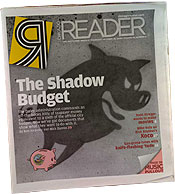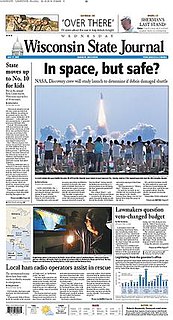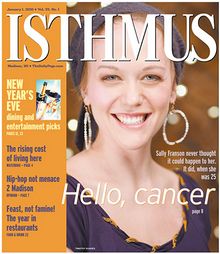
The Washington Blade is a lesbian, gay, bisexual and transgender (LGBT) newspaper in the Washington, D.C. metropolitan area. The Blade is the oldest LGBT newspaper in the United States and third largest by circulation, behind the Philadelphia Gay News and the Gay City News of New York City. The Blade is often referred to as America's gay newspaper of record because it chronicled LGBT news locally, nationally, and internationally. The New York Times said the Blade is considered "one of the most influential publications written for a gay audience."

The Star Tribune is the largest newspaper in Minnesota. It originated as the Minneapolis Tribune in 1867 and the competing Minneapolis Daily Star in 1920. During the 1930s and 1940s Minneapolis's competing newspapers were consolidated, with the Tribune published in the morning and the Star in the evening. They merged in 1982, creating the Star and Tribune, and it was renamed to Star Tribune in 1987. After a tumultuous period in which the newspaper was sold and re-sold and filed for bankruptcy protection in 2009, it was purchased by local businessman Glen Taylor in 2014.

The San Francisco Bay Guardian was a free alternative newspaper published weekly in San Francisco, California. It was founded in 1966 by Bruce B. Brugmann and his wife, Jean Dibble. The paper was shut down on October 14, 2014. It was relaunched in February 2016 as an online publication.

The Dayton Daily News (DDN) is a daily newspaper published in Dayton, Ohio, United States. It is owned by Cox Enterprises, Inc., a privately held global conglomerate headquartered in Atlanta, Georgia, United States, with approximately 55,000 employees and $21 billion in total revenue. Its major operating subsidiaries are Cox Communications, Cox Automotive, and Ohio Newspapers.

The Chicago Reader, or Reader, is an American alternative weekly newspaper in Chicago, Illinois, noted for its literary style of journalism and coverage of the arts, particularly film and theater. It was founded by a group of friends from Carleton College.

The Milwaukee Journal Sentinel is a daily morning broadsheet printed in Milwaukee, Wisconsin, where it is the primary newspaper. It is also the largest newspaper in the state of Wisconsin, where it is widely distributed. It is currently owned by the Gannett Company.
DigBoston—formerly known as the Weekly Dig and known colloquially as The Dig—is a free alternative newspaper in Boston, Massachusetts. It covers news in the Greater Boston area and offers commentary on music, arts, politics, business, film, sex, food, drink and more, as well as providing local bar, entertainment and club listings. DigBoston is distributed Thursdays, free of charge, in self-serve newspaper dispensers located throughout the city, as well as in local businesses.
Philadelphia City Paper was an alternative weekly newspaper in Philadelphia, Pennsylvania. The independently owned paper was free and published every Thursday in print and daily online at citypaper.net. Staff reporters focused on labor issues, politics, education and poverty. Critics reviewed the city's arts, entertainment, literary and restaurant scene. Listings of concerts, art exhibits, dance performances and other events were carried in the paper and in a comprehensive online events calendar.

The Savannah Morning News is a daily newspaper in Savannah, Georgia. It is published by Gannett. The motto of the paper is "Light of the Coastal Empire and Lowcountry". The paper serves Savannah, its metropolitan area, and parts of South Carolina.

Creative Loafing is an Atlanta-based publisher of a monthly arts and culture newspaper/magazine. The company publishes a 60,000 circulation monthly publication which is distributed to in-town locations and neighborhoods on the first Thursday of each month. The company has historically been a part of the alternative weekly newspapers association in the United States.
The Badger Herald is a newspaper serving the University of Wisconsin–Madison community, founded in 1969. The paper is published Monday through Friday during the academic year and once during the summer. Available at newsstands across campus and downtown Madison, Wisconsin and published on the web, it has a print circulation of 6,000.

Metro Newspapers, also known as Weeklys, is an American newspaper company based in San Jose, California. It publishes five free alternative weekly newspapers in Northern California: Metro Silicon Valley, Good Times, the Pacific Sun, East Bay Express and the North Bay Bohemian; and eight community newspapers: the Gilroy Dispatch', the Hollister Free Lance, the Morgan Hill Times, the King City Rustler, Salinas Valley Tribune, Aptos Life, The Pajaronian and Press Banner.

The Wisconsin State Journal is a daily newspaper published in Madison, Wisconsin by Lee Enterprises. The newspaper, the second largest in Wisconsin, is primarily distributed in a 19 county region in south-central Wisconsin. As of September 2018, the Wisconsin State Journal had an average weekday circulation of 51,303 and an average Sunday circulation of 64,820.
The Capital Times is a digital-first newspaper published in Madison, Wisconsin by The Capital Times Company, a joint venture between Capital Newspapers and Lee Enterprises. The Capital Times formerly published paper editions Mondays through Saturdays. The print version ceased daily (Monday–Saturday) paper publication with its April 26, 2008 edition. It became a primarily digital news operation while continuing to publish a weekly tabloid in print. Its weekly print publication is delivered with the Wisconsin State Journal on Wednesdays and distributed in racks throughout Madison.
Community Newspapers Inc. (CNI) is a subsidiary of Gannett. Based in New Berlin, Wisconsin, it publishes eight weekly newspapers in the Milwaukee metropolitan area. CNI has about 110 full-time employees and about 30 part-time employees.

The Hillsboro Argus was a twice-weekly newspaper in the city of Hillsboro, Oregon, from 1894 to 2017, known as the Washington County Argus for its final year. The Argus was distributed in Washington County, Oregon, United States. First published in 1894, but later merged with the older, 1873-introduced Forest Grove Independent, the paper was owned by the McKinney family for more than 90 years prior to being sold to Advance Publications in 1999. The Argus was published weekly until 1953, then twice-weekly from 1953 until 2015. In early 2017, it was reported that the paper was planning to cease publication in March 2017. The final edition was that of March 29, 2017.

Isthmus is a free alternative newspaper based in Madison, Wisconsin (US). Founded by Vince O'Hern and Fred Milverstedt in 1976, the paper is published on Thursdays, and has a monthly circulation of 35,000. In 2020 the newspaper became a nonprofit, joining a growing number of local news outlets turning to community support to fund operations. Isthmus offers local news, opinion, sports and coverage of the arts, dining and music scenes.
Louis G. Fortis is an American economist, educator, and newspaper publisher-editor who served three terms as a Democratic member of the Wisconsin State Assembly from Milwaukee County.

City Pages was an alternative newspaper serving the Minneapolis–St. Paul metropolitan area. It featured news, film, theatre and restaurant reviews and music criticism, available free every Wednesday. It ceased publication in 2020 due to a decline in ads and revenue related to the COVID-19 pandemic.













